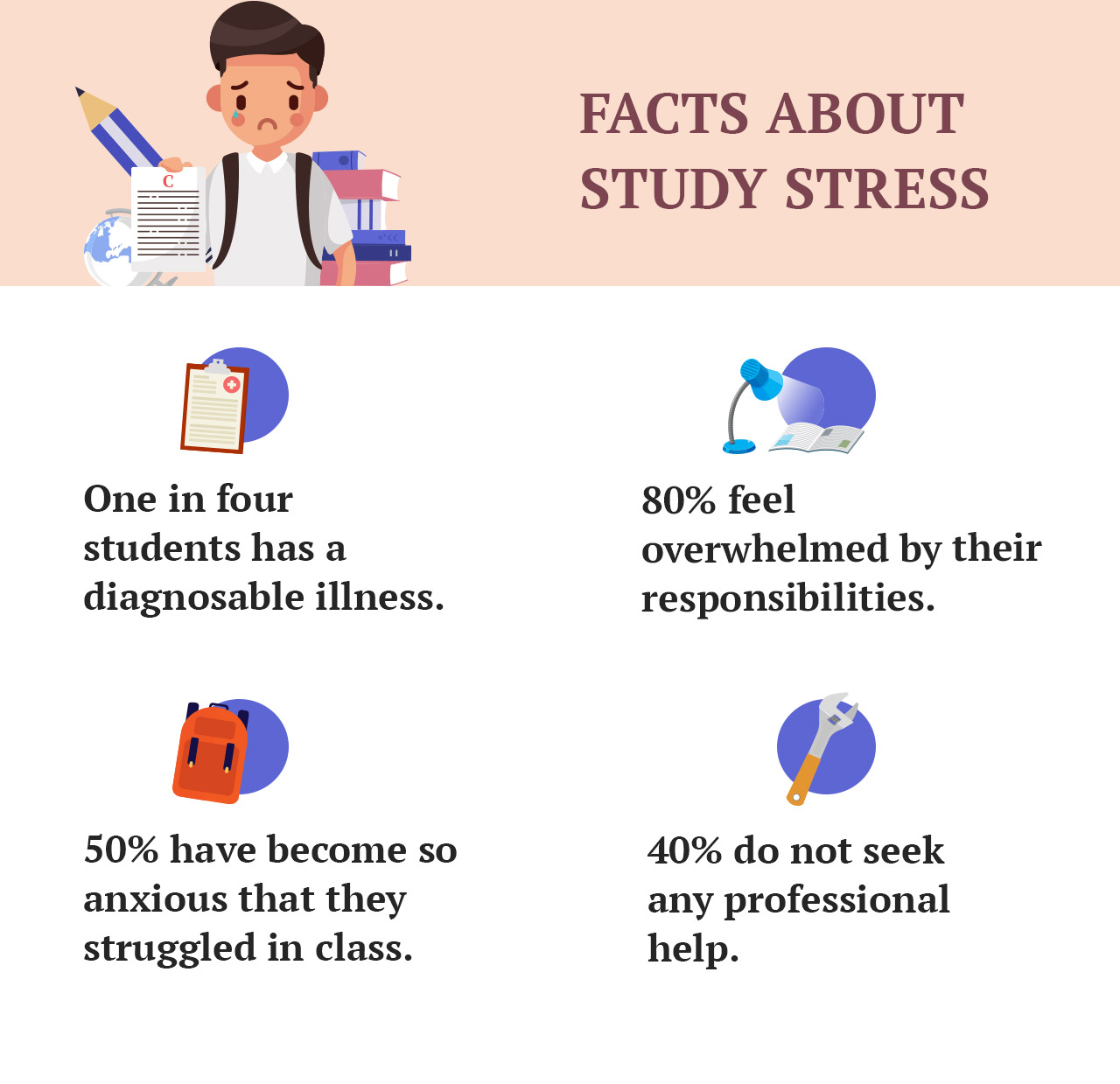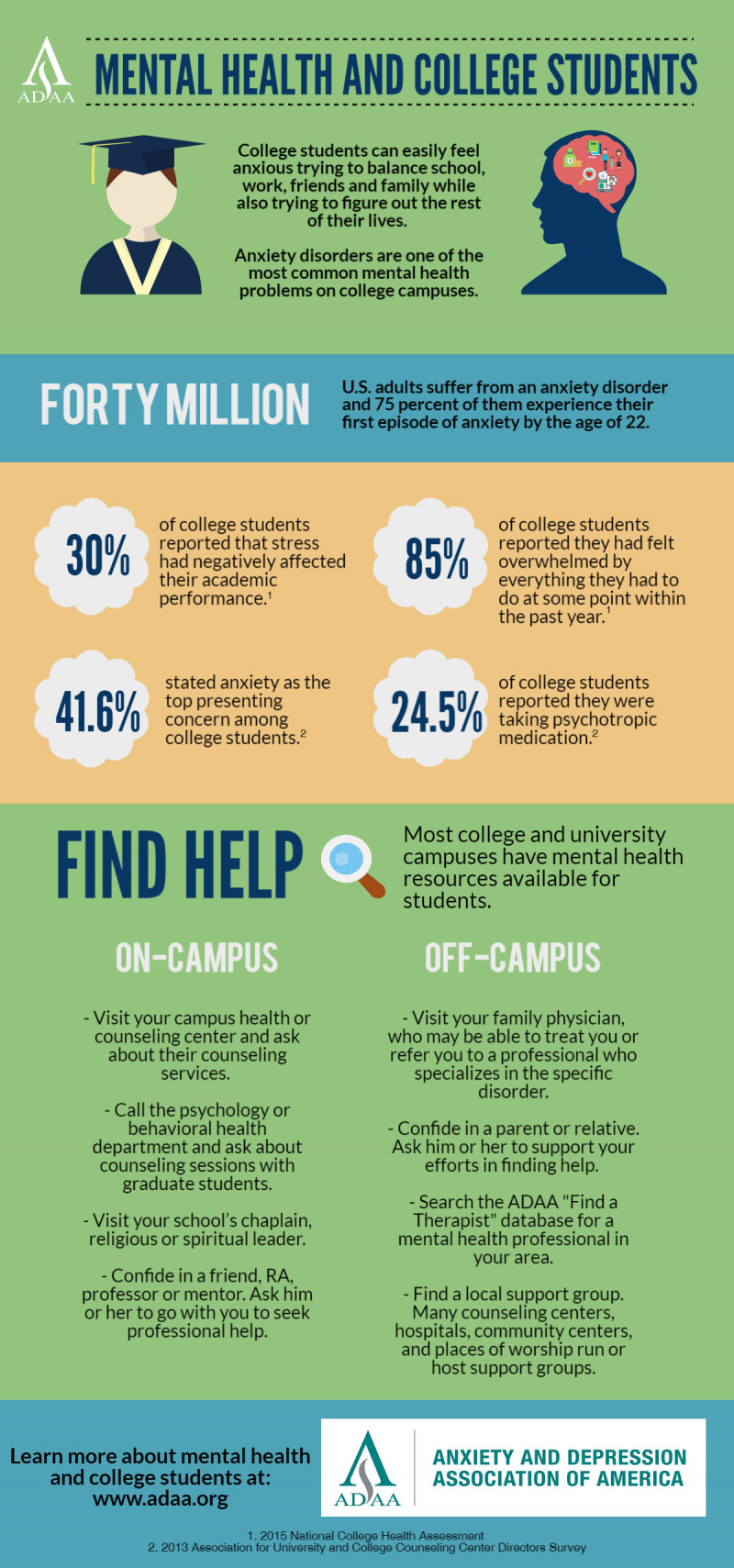A dream to study abroad can easily turn into a nightmare. You may be wondering what we’re talking about.
It’s simple: over half of international students are at risk of study-related stress, anxiety and depression.
Just look at these figures:
- 50% of international students experience high levels of anxiety.
- 75% of them also feel more stressed.
- 34.5% of students experience different levels of depression.
- 85% of college students feel overwhelmed by a heavy workload during the study year.
🗝️ Study Stress and Anxiety: Key Facts
Before we move on to recent studies on study stress, let’s find out what stress is and the different types.
The American Psychological Association (APA) defines three types of stress:
Acute Stress
In our life, we face acute stress on almost a daily basis. It can be caused by both positive and negative factors. When you’re excited about getting an A+ on a tough exam, you’re experiencing positive acute stress. An example of negative acute stress is losing your smartphone. The key feature of acute stress is that it doesn’t last too long or occur too frequently and doesn’t cause significant damage to your physical or mental health.

Episodic Acute Stress
Were there periods in your life when it seemed that if something could go wrong, it did? Or that you’re always rushing but are barely on time? These are examples of episodic acute stress. Some people with acute stress reactions are irritable, short-tempered, tense and anxious. Studying abroad can become very stressful for them.
Another cause of episodic acute stress is ceaseless worry. Any situation may seem to be a catastrophe: an exam, new professor, new class, new country. Treatment for episodic acute stress usually requires professional help.

Chronic Acute Stress
Chronic acute stress occurs when a person can’t find a solution for a miserable situation that lasts for seemingly interminable periods of time. Some chronic stresses are caused by traumatic experiences.
The worst aspect of this type of stress is we get used to it. This is the most dangerous type of stress because it can result in suicide, heart attacks and even cancer. Physical and mental resources are drained through long-term attrition. Chronic stress is difficult to treat and requires extended medical and behavioral treatment as well as stress management.
Anxiety is a typical reaction to stress. Let’s find out more about study abroad anxiety that affects international students:

Students’ Anxiety in Classes
Recent studies claim that half of international students experience in-class anxiety when they face problems throughout their learning process. It affects students’ in-class performance and causes them to fail the course.
Another problem that arises is the learning strategies of international students usually do not fit into the existing culture of their destination country.
Exam Anxiety
If you experience panic or fear before and/or during an exam or test, this is exam anxiety. Students can experience two levels of this type of anxiety:
– Low exam anxiety means that students feel a little nervous about an exam but are still able to focus on their studies. This type of anxiety passes quickly and doesn’t involve intrusive thoughts.
– High exam anxiety is characterized by an immediate anxiety reaction in direct connection with an upcoming test. Students may miss the exam or may endure it with extreme fear. Sometimes students experience panic attacks.
Studies reported a direct correlation between exam anxiety and English proficiency level. For example, Y. Thai and Y. Li in their article reported the connection between high exam anxiety levels and low scores on English proficiency tests.

Students’ Language Anxiety
Numerous studies prove that international students experience certain levels of anxiety when they have to interact with others. Scientists reported on reading, writing, listening and speaking anxiety among learners. Students with an advanced level of English suffer more pressure during their studies than learners at beginning or intermediate levels.
Students’ Social Anxiety
Another type of anxiety that international students experience is social anxiety when they have to interact with others or are “being scrutinized by other people.” Studies show that Asian students state that they face higher levels of social anxiety than native ones on both oral and written communication.
We all have to speak in public from time to time. Perhaps, this is one of the most fearful things for many people who then try to avoid it whenever they can.
Students with a high level of social anxiety even avoid classes where they have to participate in class debates or presentations. Also, studies reveal that Asian female students more often decide not to participate in group studies and stay quiet during lectures. Not fully engaging may be a consequence of the Chinese culture where some women are taught to be impassive and silent. This leads to the problem of identifying themselves as learners.
Students’ Family Anxiety
Did you know that family factors such as money problems, experiencing childhood violence, a parents’ divorce, etc., may lead to study anxiety among students? Moreover, poor communication, conflicts, and lack of closeness among family members are related to anxiety disorders.
Students who experienced the negative aspects described above feel uncomfortable in a new class, especially in a foreign country. Impromptu public speaking for such students makes them quite anxious.
If you want more facts on mental health and US college students, check out the ADAA infographic below:

😡 Learn the Symptoms
Now, you’re aware of the common types of study abroad anxiety and stress. It’s time to learn more about the symptoms of study stress and anxiety.
Depending on their stress level, a student can face one or more typical symptoms: physical, emotional, cognitive and behavioral.
Below you’ll find the most common signals that you should be aware of:
Physical Symptoms
- Frequent constipation, diarrhea, or other intestinal problems
- Tremors or trembling of lips
- Frequently getting sick
- Chest, neck, and back pain
- Frequent headaches
- Muscle aches
- Trouble getting to sleep, insomnia, sleeplessness
- Heartburn
- Fatigue
- Clenched teeth
- Gaining or losing weight
Emotional Symptoms
- Easily lose patience, irritability
- Sadness or depression
- Feeling overwhelmed
- Inability to enjoy things you used to enjoy
- Sense of isolation and/or loneliness
- Frequent pessimistic attitude
- Restlessness
Cognitive Symptoms
- Trouble concentrating
- Difficulties with remembering things, such as assignments or paper deadlines
- Deadline panic
- Chronic worrying, unwanted and/or anxious thoughts
- Mumbling or stuttering
Behavioral Symptoms
- Change in eating and sleeping habits
- New or extended use of drugs, tobacco, or alcohol
- Nail biting, self-harm
- Procrastination or failure to complete daily tasks
- Change in study performance
- Desire for social isolation
- Trouble getting along with peers, such as classmates or teachers
If you experience one or more symptoms mentioned above, you might need to contact your counselor. In case you’re looking for additional information on the issue, check out an essay database with works on the topic of stress. They usually contain unique research, fresh takes, and a variety of aspects covered. Also, you may want to try our short diagnosis quiz on your stress level below.
🤯 Are You Stressed? (Quiz)
Take this quiz to determine if you’re stressed and if you need any professional assistance:
Add up your scores and check the results.
8 or more points: You’re experiencing critical stress levels. You should take serious steps to reduce stress factors. Contact your doctor or counselor now. Ask for help!
6–7 points: You are experiencing severe levels of stress. If you neglect it, this can result in physical problems. You should seek help and counseling if appropriate.
4–5 points: You’re experiencing stress levels that might get more serious. Search for sources that will help you to deal with the stress.
3 points or less: Your stress levels are normal for the average person. This stress will likely disappear soon.
✅ How to Overcome Study Stress
A well-defined problem is halfway to a solution. If you’re going to study abroad, you should be aware of ways to deal with and reduce anxiety and stress. And the IvyPanda team is here to help you. We’ve gathered the most useful tips and advice. Just keep reading!
9 ways to deal and reduce your study abroad anxiety and stress:
- Study enough. Among common fears that cause anxiety is the constant fear that you don’t pay enough attention to your assignments and classes. Solution? Dedicate as much time as you can!
- Become familiar with upcoming tests. Try to study in the same classroom where you will be taking the test or make a test rehearsal under timed conditions. These can help familiarize you to test-taking conditions.
- Try and find effective learning strategies that work for you. Some students prefer to hire a private tutor. Others use flashcards to memorize course materials. Perhaps you might want someone to check your assignments for compliance with the professor’s instructions. Try a variety of techniques to find the one for you.
- Don’t forget about relaxation. Think about what calms you down? Maybe, you take deep breaths or do yoga exercises, squeeze a stress ball or read non-fiction books. Using a favorite relaxation technique can help reduce the symptoms of study abroad anxiety.

- Eat healthy. Stress, anxiety and depression may result in overeating or refusal of food, as well as changes in taste habits. Remember that drinking too much coffee can exacerbate the physical symptoms of anxiety we mentioned above. Junk food and/or night eating will negatively impact your physical health. Moreover, overeating can easily become a bad habit.
- Sleep enough. Here’s the dilemma: when you’re stressed, you may experience trouble with sleep. On the other hand, lack of sleep negatively impacts your cognitive abilities and mood. That’s why you should control your sleep time and avoid as much as possible staying up late before an important exam.
- Don’t forget about sports. Regular exercise helps to release tension. So do not skip your gym time, yoga classes or even morning run.
- Plan your time. When planning your schedule, leave additional time for unexpected situations like traffic or a class location change. This will help you to avoid unnecessary worries that you will be late for an exam or miss an important meeting.
- Control your finances. Education abroad is quite expensive. Even if you have a scholarship and your parents provide full financial support, you may still need an additional source of income. If so, check your visa rules and take a part-time job. Make sure that it won’t affect your academic performance.
If you need more advice on stress management techniques and lifehacks, don’t forget to check out the IvyPanda blog. We’re sure that you can find a lot of useful information

![55 Study Abroad Statistics: Facts and Figures [2026 Updated]](https://ivypanda.com/blog/wp-content/uploads/2020/11/travel-necessities-309x208.jpg)

![A Shortcut to Deciding Where to Study Abroad [Infographic]](https://ivypanda.com/blog/wp-content/uploads/2016/06/portrait-smiling-woman-showing-air-ticket-passport-309x208.jpg)